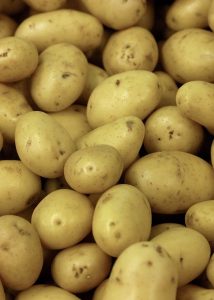Plants as producers of platform chemicals
Look around you. How many synthetic materials do you see? Here at my work space I see many, from the keyboard I’m typing on to my desktop and the plastic pens in their tray. All these materials are still being made from petroleum. I recently read that the amount of petroleum worldwide is declining by a thousand barrels per second. With total reserves estimated at 1,500 billion barrels this may not seem such a big deal but a time is coming when extracting petroleum will cost more than it yields. And then we will be needing alternatives. In this article, I will discuss the potential of plants as producers of platform chemicals.
Polymers
The tricky thing is that the production of synthetic materials requires chemicals. Unraveling synthetics shows that they consist of polymers. And these polymers consist of various monomers, some of which are linked to one and the same platform molecule. We call these molecules platform chemicals, the basic building blocks of chemistry made from petroleum.
Biomass
Thankfully, full-fledged alternatives are available for many of these chemicals: biomass. This is logical as, like biomass, petroleum did also derive from biomass, albeit millions of years old. Fellow scientists at Wageningen University & Research use biorefinery technologies to unravel components of this biomass. Conversion techniques are then deployed to convert these components into a wide range of biobased products, from fuel to chemicals to polymers and, finally, materials.
 In addition, sugars from biomass can produce the desired green building blocks in a fermenter via micro-organisms. But we have discovered that plants can in some cases produce platform chemicals directly themselves, rendering the fermentation stage obsolete. A good example is the production of itaconic acid in plants. Companies in the polymer industry are very interested in this platform molecule, which can be the basis for products such as synthetic coatings and fibers. We have proven that the starch potato plant can produce this organic acid without affecting other desired processes such as the growth of the tubers and the production of starch. To achieve this we cloned a gene of the only fungus that produces itaconic acid, which we then adapted and built into the plant.
In addition, sugars from biomass can produce the desired green building blocks in a fermenter via micro-organisms. But we have discovered that plants can in some cases produce platform chemicals directly themselves, rendering the fermentation stage obsolete. A good example is the production of itaconic acid in plants. Companies in the polymer industry are very interested in this platform molecule, which can be the basis for products such as synthetic coatings and fibers. We have proven that the starch potato plant can produce this organic acid without affecting other desired processes such as the growth of the tubers and the production of starch. To achieve this we cloned a gene of the only fungus that produces itaconic acid, which we then adapted and built into the plant.
Platform chemicals
There are other chemical building blocks that can be produced by plants. We are carrying out research into caprolactam, a molecule which forms the basis for nylon 6, for instance. Another example is fructose as a foundation for a variety of furan-like applications, such as a biobased alternative for the ubiquitous PET bottle. And there are other lines of research too.
My colleagues and I are convinced that we can get more from plants than is currently the case. The production of platform chemicals is one of the developments with lots of potential, which is why we are working together with government and industry in the AgriFood top sector to develop new technologies. The best technological route varies per molecule. Sometimes plants can do the work themselves, at other times fermentation offers the best solution, and there are cases where a chemical conversion process is the most obvious choice.
In this way, we gradually become less dependent on petroleum. I relish the challenge each and every day of contributing to this development.
I am interested in hearing what you think, so please share your comments below.
Itaconzuur:
- Platformchemicaliën in planten:caprolactam precursors en itaconzuur
- Productie van platformchemicaliën door planten
- Plants as Solar-Powered Biofactories
Caprolactam:
Rubber and inuline:

